Human Rights (383 found)
What Refugees Say…
Between March‐April this year, focus group discussions were held with temporary returnees to SE Burma/ Myanmar from all 9 refugee camps along the Thailand‐Burma/ Myanmar border. The aim was to gain a snapshot of individual perspectives and concerns on current conditions on the ground, rather than conducting a formal survey representational of the whole refugee caseload.
The consultations focused on the conditions in the areas they returned to, the changes they and residents in those areas had detected since recent political and military shifts in the country, and their perceived current barriers to return.
The participants were identified by Section Leaders, with criteria that they must have returned to SE Burma/ Myanmar since the ceasefires were brokered, be adults, and that there should be some gender equity amongst them. In total, 85 temporary returnees participated in the consultations, with 35% being female. Over 100 others, comprising senior community leaders and CBO staff were also engaged through the process, although the main findings in this report only reflect the perspectives of those who had recently returned to their country of origin […]
• • •In Pursuit of Justice: Reflections on the Past and Hopes for the Future of Burma
Since 2011, Burma has begun to emerge from 50 dark years of dictatorship. Now, under President Thein Sein’s nominally civilian government the possibility has arisen for Burma to begin rebuilding and reconciling divided segments of the nation, and to provide justice to victims for decades of human rights abuses.
Burma’s minority ethnic communities have experienced grave human rights abuse at the hands of the SPDC regime and its strong arm of the Burmese military, or Tatmadaw. In order to transition successfully towards true democracy and national reconciliation, the Burmese government must address, and act upon, the specific needs expressed by victims of past abuse, documented and expounded herein, in order to move away from the abusive culture of the past towards a united future.
Within this report you will find a detailed history of Burma’ ethnic conflict, how that conflict has been sewn into the very fabric of the SPDC regime’s ideology and governing strategy, and ways in which the Tatmadaw has implemented the regime’s strategy by crippling livelihoods, physically and mentally abusing, and destroying the security of Burma’s minority ethnic communities […]
• • •State of the Word’s Minorities and Indigenous Peoples 2014
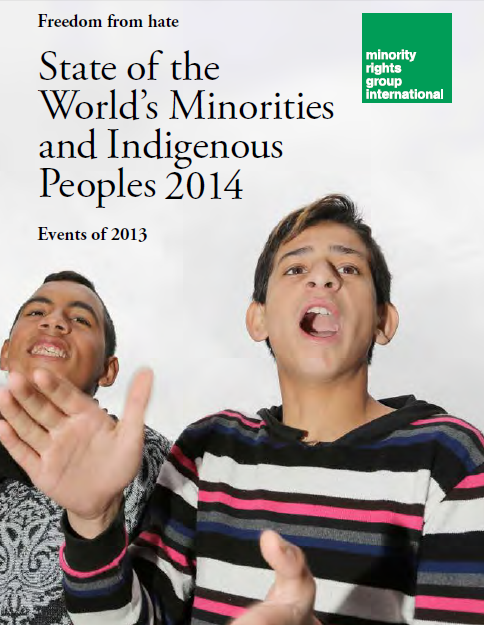 Hate crime towards minorities and indigenous peoples is a daily reality across Asia but is often ignored by the governments of the region, Minority Rights Group International (MRG) warns in its annual report. This year’s flagship report, State of the World’s Minorities and Indigenous Peoples 2014, is themed around ‘Freedom from Hate’ and shows that a worrying trend of vilification and hostility towards minorities and indigenous peoples has spread across the region.
Hate crime towards minorities and indigenous peoples is a daily reality across Asia but is often ignored by the governments of the region, Minority Rights Group International (MRG) warns in its annual report. This year’s flagship report, State of the World’s Minorities and Indigenous Peoples 2014, is themed around ‘Freedom from Hate’ and shows that a worrying trend of vilification and hostility towards minorities and indigenous peoples has spread across the region.
A key aspect of hate crime and hate speech is its invisibility, especially when governments or societies overlook or tolerate entrenched patterns of discrimination against particular communities, says MRG. Across Asia, governments have failed to provide adequate protection to its minority and indigenous populations.
“Hate crimes have been able to flourish in Asia largely as a result of the complicity or support of politicians who stand to gain from the persecution of minorities,” says Mark Lattimer, MRG’s Executive Director. “Hate speech goes unchallenged and crimes are often under-acknowledged and under-reported, enabling perpetrators to operate with impunity.” […]
• • •Myanmar: Comprehensive Solutions Needed for Recent and Long-term IDPs Alike
IDMC estimates that there are up to 642,600 internally displaced people (IDPs) in Myanmar, forced to flee their homes by armed conflict and inter-communal violence. The figure includes up to 400,000 people living in protracted displacement as a result of conflict in the south-east of the country – in southern Shan, Kayah, Kayin and Mon states and Bago and Tanintharyi regions – and 98,000 displaced by conflict in Kachin and northern Shan states since 2011. It also includes around 140,000 people displaced by inter-communal violence in Rakhine state since 2012, and more than 5,000 who fled their homes in Mandalay region in 2013. Disasters brought on by natural hazards and forced evictions linked to land grabs and the exploitation of natural resources have caused further displacement, including in areas where people have already fled conflict and violence.
Landmines and unexploded ordnance constitute a significant obstacle to IDPs’ return in Kachin, northern Shan and the south-east. Internally displaced women and girls in Kachin and northern Shan face the threat of sexual violence. Muslim IDPs in Rakhine are confined to camps, where they have little or no access to health care, education or livelihoods, and shelters are in need of maintenance in Rakhine, Kachin and northern Shan […]
• • •Thai Oversea Investment on Coal Mining in Myanmar: The Private Business Violating Human Rights and Causing Environmental Impact on Ethnic Communities along Tenasserim Border
Tanintharyi Hills or Tanintharyi Range is the geographical name of a roughly 1,700 km long mountain chain, part of the Indo-‐Malayan mountain system in Southeast Asia. The Tanintharyi Range covered with lush green forest and is a natural border line between Thailand and Myanmar. Across the hills in Myanmar side is Tanintharryi Region. The capital of this administrative region is Dawei which consists of diverse of ethnicity such as Dawei or Tavoy, Karen or Khayin and Mon. The local languages spoken by majority of the population are Tavoyan and Karen. In the past, the areain which bordering near Kanchanaburi province of Thailand was a former war zone between Karen ethnic group and Burmese junta government. It was intense conflict war zone during 1996 -‐ 1997 until cease fire agreement between the Burmese junta and the Karen National Union (KNU) was signed in 2012 […]
• •Trafficking in Persons Report 2014
Burma is a source country for men, women, and children subjected to forced labor, and for women and children subjected to sex trafficking in other countries. Burmese men, women, and children who migrate for work abroad, particularly to Thailand and China, are subjected to conditions of forced labor or sex trafficking in these countries. Poor economic conditions within Burma continue to drive large numbers of Burmese men, women, and children to migrate through both legal and illegal channels for work primarily in East Asia, as well as destinations including the Middle East, South Asia, and the United States. Men are most often subjected to forced labor, often in the fishing, manufacturing, and construction industries abroad. Women and girls are primarily subjected to sex trafficking or domestic servitude. The large numbers of migrants seeking work in Thailand’s fishing and domestic work sectors do so outside formal channels. Some Burmese men in the Thai fishing industry are subjected to debt bondage, passport confiscation, or false employment offers; some are also subjected to physical abuse and are forced to remain aboard vessels in international waters for years […]
• • •Myanmar: End Wartime Torture in Kachin State and Northern Shan State
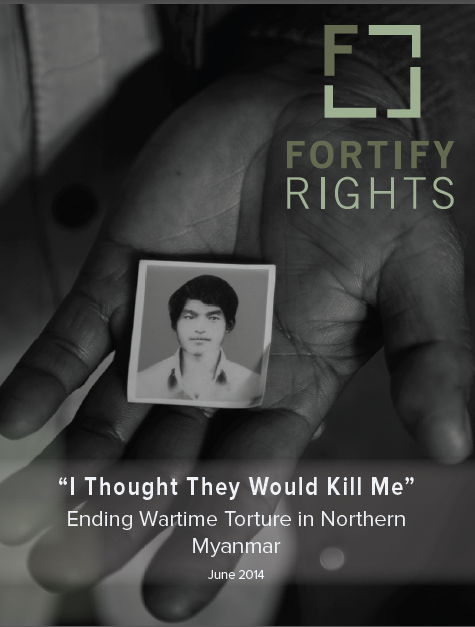 (Yangon)— For the past three years, Myanmar authorities have systematically tortured Kachin civilians perceived to be aligned with the Kachin Independence Army (KIA), Fortify Rights said in a new report released today. Fortify Rights believes these abuses constitute war crimes and crimes against humanity. The government of Myanmar should intervene immediately to end the use of torture in the conduct of the ongoing war in Kachin State and northern Shan State, and it should credibly investigate and prosecute members of the Myanmar Army, Myanmar Police Force, and Military Intelligence who are responsible for the serious crimes described in this report.
(Yangon)— For the past three years, Myanmar authorities have systematically tortured Kachin civilians perceived to be aligned with the Kachin Independence Army (KIA), Fortify Rights said in a new report released today. Fortify Rights believes these abuses constitute war crimes and crimes against humanity. The government of Myanmar should intervene immediately to end the use of torture in the conduct of the ongoing war in Kachin State and northern Shan State, and it should credibly investigate and prosecute members of the Myanmar Army, Myanmar Police Force, and Military Intelligence who are responsible for the serious crimes described in this report.
The 71-page report, “I Thought They Would Kill Me”: Ending Wartime Torture in Northern Myanmar, describes the systematic use of torture and other cruel, inhuman, and degrading treatment or punishment (“ill treatment”) of more than 60 civilians by Myanmar authorities from June 2011 to April 2014. Members of the Myanmar Army, Myanmar Police Force, and Military Intelligence deliberately caused severe and lasting mental and physical pain to civilians in combat zones, […]
• • •Myanmar: “Build on Achievements and Reach for Democracy” – Outgoing UN Special Rapporteur
GENEVA (30 May 2014) – The United Nations Special Rapporteur on the human rights situation in Myanmar, Tomás Ojea Quintana, today calls on the Government and people of Myanmar to build on the many achievements of the last three years in laying a solid foundation for a robust democracy.
• • •United States Commission on International Religious Freedom’s 2014 Annual Report
Political reforms in Burma have not improved legal protections for religious freedom and have done little to curtail anti-Muslim violence, incitement and discrim¬ination, particularly targeting the Rohingya Muslim minority. Police failed to intervene effectively and the government has taken inadequate steps to address the underlying causes of sectarian violence or hold individ¬uals fully accountable. State-sponsored discrimination and state-condoned violence against Rohingya and Kaman ethnic Muslim minorities also continued, and ethnic minority Christians faced serious abuses during recent military incursions in Kachin state. Based on these systematic, egregious, ongoing violations, USCIRF continues to recommend that Burma be designated as a “country of particular concern,” or CPC, in 2014. The State Department has designated Burma a CPC since 1999 […]
• • •Department of State: Statement by Marie Harf, Deputy Spokesperson: United States Concern Over Events in Rakhine State
The United States remains deeply concerned by the humanitarian crisis in Burma’s Rakhine State. Violent mob attacks on United Nations and nongovernmental organization offices worsened an already troubling situation stemming from restriction of the operations of a major humanitarian organization that provided health care services to 140,000 internally displaced persons and hundreds of thousands of additional individuals in need. Currently, large segments of the population do not have access to adequate medical services, water, sanitation, and food. The government has so far failed to provide adequate security and the travel authorizations necessary for the humanitarian aid workers to resume their life-saving services […]
• • •
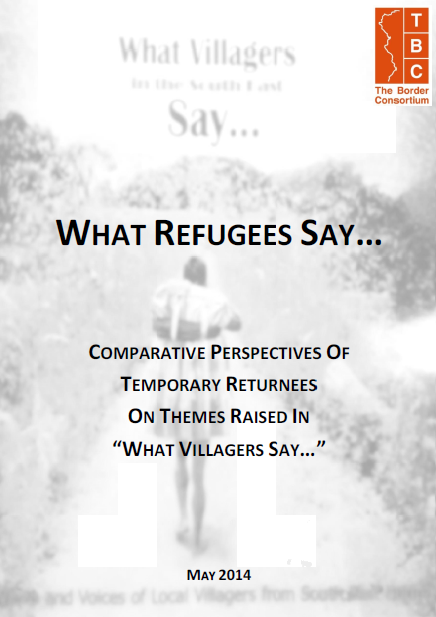
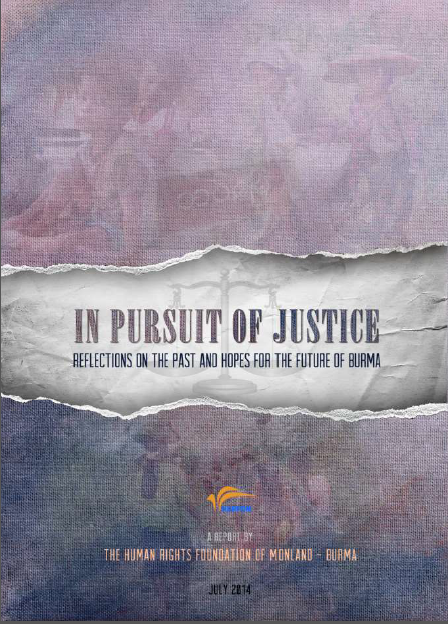
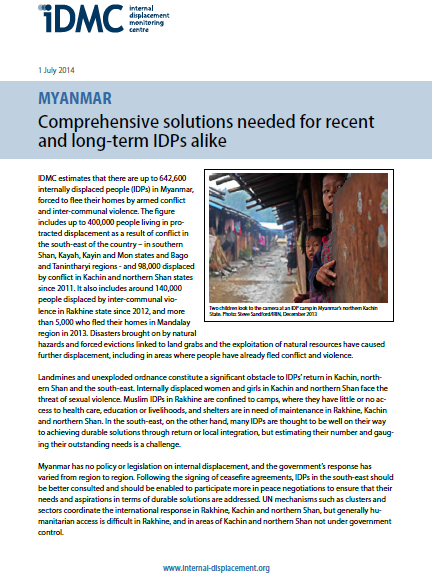
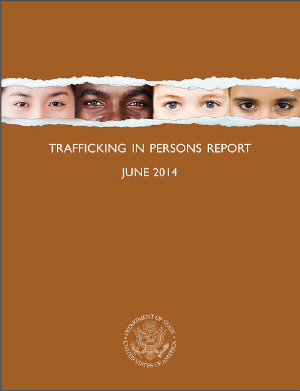
 All posts
All posts